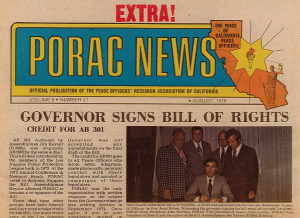By Rick Baratta
AB 301: The Peace Officers’ Bill of Rights

In 1973 a bill (AB 1800) was proposed that would extend civil rights to officers, which PORAC supported. In 1974 PORAC amended this legislation and joined with the Los Angeles Police Protective League (LAPPL- not a PORAC member) to cosponsor the “Policemans’ Bill of Rights.”
The bill was naturally opposed by management organizations, chiefly the County Supervisors’ Association, and the League of California Cities. The legislation failed, and was rewritten by PORAC and introduced as AB 301.
President Bill Bean appointed Wally Colfer (SEBA) to head up an Inter-Association Liaison Committee, composed of PORAC, CPOA, COPS, LAPPL, Los Angeles Sheriffs’ Association, and the attorney general. The president of CPOA at the time was Leslie Sourissou, a former PORAC member and quiet supporter. He offered a resolution to CPOA supporting in principal the Public Safety Officers’ Procedural Bill of Rights Act, (POBR) but failed to convince their board because of the polygraph exclusion. However, PORAC and their allies succeeded in getting the bill passed out of the Assembly and into the Senate to become a two-year bill, still alive. Now in 1974, the race for governor had Jerry Brown and Huston Flournoy running neck-and-neck. The PORAC president sent a questionnaire to each candidate specifically asking their position on AB 301, including their opinion of the provision in the bill excluding peace officers from having to take a lie detector test.
Brown wrote back that he supported the legislation and was personally opposed to lie detector tests for public employees. Flournoy declined to respond. Brown was elected governor, and the bill eventually reached his desk in 1976, opposed adamantly by CPOA and CSAC because of the polygraph exclusion.
Joe Aceto was PORAC president in 1976 and heavily involved in lobbying the governor to sign the AB 301. Governor Brown hesitated in making the decision because of a great deal of pressure from police management to veto it. Just before the deadline was reached, Aceto received a call from Bill Bean, reminding him that Brown had said he supported the bill, and this had been reported in PORAC News. Aceto turned the office upside down to find the written response and finally succeeded. Aceto immediately sent a copy of Brown’s original response and a copy of the PORAC News article to the governor, just to remind him of his position. He signed the bill and AB 301 became law.
If any class of public employees understands the importance of constitutional rights, it has to be the peace officer. Every search or arrest brings into play constitutional issues surrounding the action.
Peace officers are sued, disciplined, arrested and have had cases thrown out of court because of the officer’s alleged violations of these rights, regardless of intent. Although many enlightened managers supported laws that would offer the same protection to their officers, it took the rank-and-file to make it happen.
Today these rights are taken for granted by many officers. Some merely assume that AB 301 will protect them from illegal indiscriminate actions by their employers. But, as is the case for freedom, rights are hard-won and easily lost without a strong group of people willing to fight to maintain them.
PORAC fought to obtain these rights for all California peace officers, and down through the years re-affirmed these rights through legislation and a strong Legal Defense Plan. It is to be hoped that future peace officers will continue the fight to keep them alive and demonstrate the same obstinate aggressiveness as those cops did a quarter of a century ago.
Public Safety Officers Procedural Bill of Rights Act
ABOUT THE AUTHOR: Rick Baratta is a past-general manager of PORAC, past-editor of PORAC News, and was also one of the earliest association representatives.
